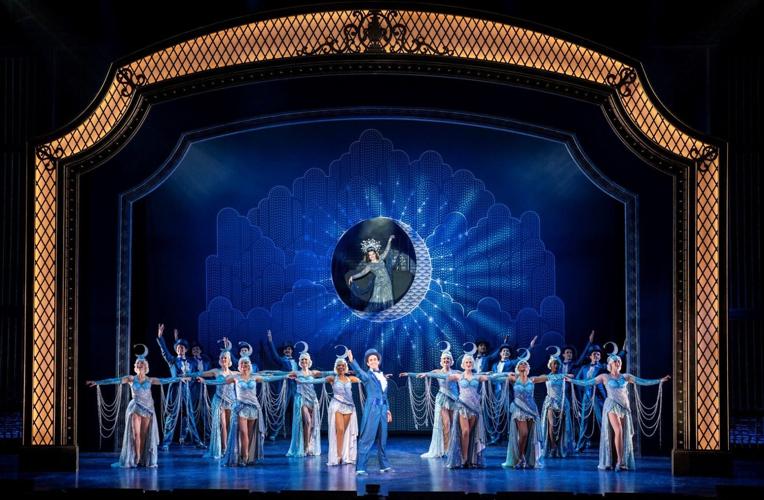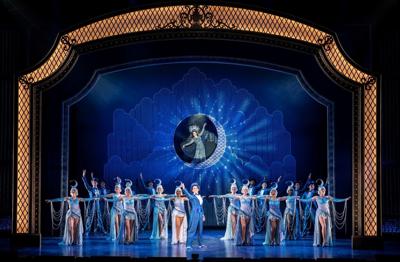42nd StreetĖý
3.5 stars out of 4Ėý
Music by Harry Warren, lyrics by Al Dubin, book by Michael Stewart and Mark Bramble, directed by Jonathan Church, choreography by Bill Deamer. Playing at the Princess of Wales Theatre, 300 King St. W., through Jan. 21. or 1-800-461-333
Early in the second act of â42nd Street,â one character tells another, âThink of âmusical comedyâ â the most glorious words in the English language!âĖý
After watching the glitzy, toe-tapping West End revival of this nostalgic 1980 offering, youâll have to agree. It might not be the deepest or most profound show ever written, but its archetypal backstage tale of talent and youthful pluck winning the day provides much-needed distraction from the current news cycle.
Whatâs more, one key relationship in director Jonathan Churchâs production has been slightly altered so itâs less problematic in this era of uneven workplace power dynamics and clearly delineated professional boundaries.
Church establishes the showâs period setting effectively. During the overture, in a series of tableaux, we see the New York City of the 1930s, where black and white video projections (designed by Jon Driscoll) evoke both the sophisticated glamour of Times Square and the grittier, harsher side of the ongoing Depression.Ėý
Then come those iconic words: âGet out your tap shoes, Francis,â and the curtain rises on a group of young hoofers tapping up a storm in their audition for a big new Broadway musical called âPretty Lady,â directed by the famous Julian Marsh (Adam Garcia).Ėý
Absent from those rehearsals is a fresh-faced ingÃĐnue from Allentown named Peggy Sawyer (Nicole-Lily Baisden) who impresses the showâs young male lead, Billy Lawlor (Olly Christopher, who alternates with Sam Lips) with her talent â and looks â but gets dismissed by the dance captain (Alyn Hawke) because sheâs late.
Soon enough, however, after a couple of impromptu numbers in the streets and in a basement tea house, Peggy displays her uncanny ability to sing, dance and act. And eventually Julian hires her for a spot in the chorus, although she quickly gets on the wrong side of the showâs demanding leading lady, Dorothy Brock (Ruthie Henshall), whose current beau (Anthony Ofoegbu) is bankrolling the show but whose lover, Pat (Michael Praed), is waiting in the wings.Ėý
Confused? Never mind. As Billy sings in one song, âWho cares if thereâs a plot or not?â â a sentiment that could apply to â42nd Streetâ itself.Ėý
What matters are the musical numbers by composer Harry Warren and lyricist Al Dubin, some of which come from the classic 1933 film directed by Lloyd Bacon, and others which were taken from songs the team penned for other films. You could call this show a jukebox musical set at a time that actually had jukeboxes.
Add in Bill Deamerâs kinetic, high-kicking choreography and musical staging, Robert Jonesâs sizzling sets and colourful sequinned costumes, Ben Cracknellâs evocative lighting and some of the most talented triple threat performers from the UK, and youâve got a show that canât miss.Ėý
Big production numbers include the splashy wish-fulfillment fantasy, âWeâre in the Money,â which includes dancers accompanying over-sized replicas of dimes, and the impossibly catchy âLullaby of Broadway,â which begins as an imploring solo sung by Julian to Peggy but eventually morphs into a huge ensemble number thatâs bursting with vitality and showbiz chutzpah. And for good old-fashioned vaudeville shtick, itâs hard to top âShuffle Off to Buffalo,â which chronicles a newlywed coupleâs amorous night on a train with lots of sexual innuendo and peek-a-boo farce.
There are also quiet moments, like Dorothyâs ballad about her lover, âI Only Have Eyes for You,â sung by Henshall with a clarity and heartfelt emotion that give her spoiled character a bit more complexity. And her duet with Peggy in the second act brims with generosity.
Other standouts include Christopherâs bright and cheerful Billy and the delightful pairing of Josefina Gabrielle and Michael Matus, who play the showâs songwriters Maggie and Bert with the comic timing and brassy voices of a Comden and Green.Ėý
Garcia has the difficult role of the older director who slowly warms to his new leading lady, and his relationship with Baisdenâs Peggy is handled tastefully. His bittersweet final solo suggests memories of decades of opening nights and promising careers.
As for Baisden, sheâs more than convincing as the showâs optimistic chorine whoâs catapulted overnight to fame.Ėý
Does the story make sense? Not a bit. Weâre told that the show-within-a-showâs leading lady is a terrible dancer, and yet when we see numbers from that show sheâs required to dance constantly. A couple of characters pop up then disappear.
The music and performers are gloriously alive and present. Like that song from another period musical, the numbers provide lots of razzle dazzle. Sometimes thatâs more than enough.





























To join the conversation set a first and last name in your user profile.
Sign in or register for free to join the Conversation